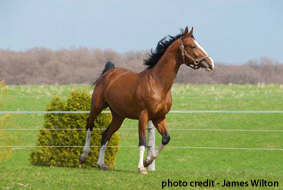ARCHIVE EQUINE NEWS STORIES
| Current news is available at TheHorsePortal.ca, Equine Guelph's online learning platform for practical, quick learning. Given the vast amount of information on horse health and welfare, Equine Guelph has archived its past news articles from 2002-2020. They are listed below, along with a search function available to find specific healthcare topics. | |
A Recession Proof Industry? July 2009
BY KIM LOGUE
Guelph, Ontario - The equine industry is a vibrant, growing component of rural Ontario, with a surprisingly significant impact on the economy -- the estimated total of annual expenditures on horses in Ontario is $2.6 billion. Despite a slow economy, the financial impact of horses in the province, both direct and indirect remains a big business, that many consider recession proof. In fact, there is an estimated $735 million annual investment in horse farm infrastructure such as new barns, fencing and indoor arenas across Ontario. This investment translates into jobs in local communities.
There has been limited investigation of this sector by either provincial or municipal government agencies. With the first such research conducted since 1996, Dr. Bronwynne Wilton, a University of Guelph researcher, has addressed the lack of attention paid to the equine community in the field of rural studies.
 The Ontario horse population is estimated to be 379,412 as of the 2006 Census of Agriculture, with a detailed breakdown of numbers is available on the Statistics Canada website. It is interesting to note that horses are listed under the category “Other livestock and Bees”.
The Ontario horse population is estimated to be 379,412 as of the 2006 Census of Agriculture, with a detailed breakdown of numbers is available on the Statistics Canada website. It is interesting to note that horses are listed under the category “Other livestock and Bees”.
While both harness racing and thoroughbred racing are important components of the Ontario equine industry, a significant portion of the growth in the industry can be attributed to the sport and recreation sector. With a high level of diversity and participation across the disciplines such as dressage, hunter-jumper, eventing, western pleasure riding, rodeo events, trail-riding, endurance riding, driving, and recreational riding as just a few of the equine disciplines enjoyed by residents of Ontario. This report developed out of a research project supported by the Sustainable Rural Communities research fund as part of the OMAFRA/University of Guelph research agreement. The original purpose of the research project was to explore the social and economic impacts of the equine industry in the rural areas of Ontario.
A recommendation resulting from the research is the long term goal to nurture the equine/equestrian industry as an important economic cluster, recognizing tourism, construction, rural services and many others are impacted by continued growth of the industry. "We are looking at a multi-million-dollar horse power engine" Wilton reports on the results of the survey. "The equestrian industry provides social, cultural and economic benefits to the people of Ontario. Just look around - for every horse in every backyard, there is the commitment of purchasing supplies, maintaining open space and covering operational costs."
Dr. Bronwynne Wilton, who lead the research, is available for interviews. She is a Post-Doctoral Research Fellow at the University of Guelph in Guelph, Ontario, Canada . Bronwynne holds a PhD in Rural Studies, a Masters of Science degree in Landscape Architecture (Rural Planning) and a Bachelors of Science Degree (Agriculture) from the University of Guelph . She is the co-editor of the 2007 book entitled: Farmland Preservation - Land for Future Generations , and is a sessional instructor in the Department of Land Resource Science at the University of Guelph . Dr. Wilton has combined her knowledge of rural geography and landscape planning with her interest in the equine industry to take a fresh look at the role of the horse in rural Ontario.